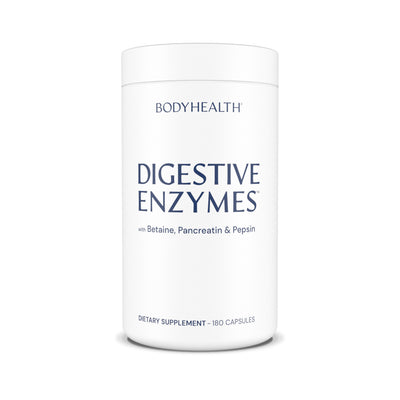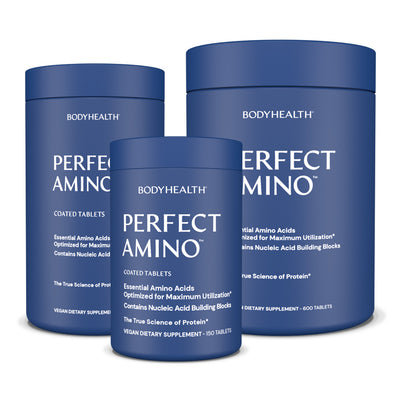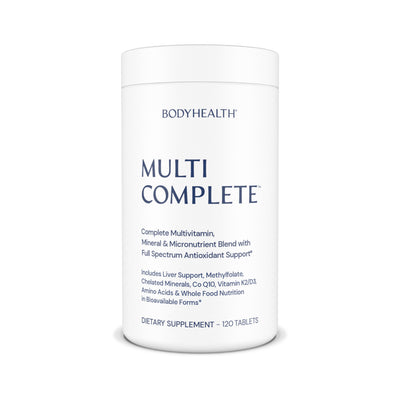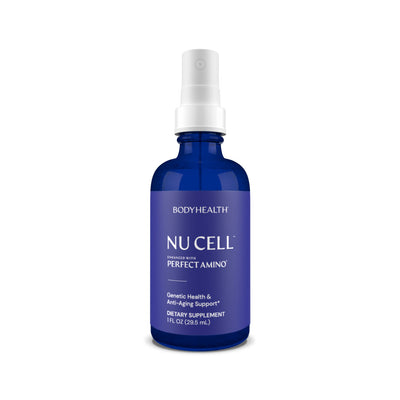PREVENTING WEAK & BRITTLE BONES AS WE AGE
May 30, 2023 5 min read

Many people consider that the weakening of bones is a natural part of aging. And this is true... in part.
But that doesn’t mean it can’t be slowed. Or even reversed, where we re-strengthen our bones. Especially when it's actually being sped upby our current food systems.
Right now, about 44 million people in the US have low bone density.
This is something that usually starts after the age of 50. But, more and more, it’s occurring earlier and earlier.
And it doesn’t have to be this way.
In this article we’re going to cover what actually causes declining bone density, and how we can prevent and even reverse this, achieving strong bones that last well into our golden years.
THE INGREDIENTS OF STRONG BONES
While there are other factors, the key constituents of bones are amino acids formed into proteins, and calcium.
The proteins form the structural framework of the bone itself, while calcium exists to fortify it and improve bone density.
When we’re low in either, proteins or calcium, our body doesn’t have what it needs to keep our bones strong and healthy. But if you just eat high amounts of protein and take calcium, it may not do much.
This goes back to the body being an interlinked ecosystem, with each part affecting and supporting each other part.
And the key parts most people are missing when their bones start to become weaker are not necessarily calcium and protein, but the factors that allow the calcium and protein to be used to keep the bones strong.
AGING, BRITTLE BONES & YOUR DIGESTIVE SYSTEM
As covered in this article, your body does not use the protein you consume as protein. Instead, in your stomach, proteins are broken down into their basic building blocks, the amino acids, which are then remade into the proteins your body needs, in the forms it needs them in.
For proteins to be broken down, your stomach must become very acidic. There is a scale of acidity called the ph scale. It measures acidity as 1 being the most acidic and 15 being the most alkaline (not acidic).
To fully digest proteins so your body can actually use them, the acidity of your stomach must reach a ph of 1 or 2.
If it doesn’t, then the proteins are not fully broken down and all will not be used to make new proteins in the body. So you could be eating more and more protein… but your body is getting less and less of the amino acids from it to usefor making new protein, including new protein to keep bones healthy and strong.
But we also need this high acidity for another reason. When we consume minerals, such as calcium, they also must be broken down by strong acids or the body can’t use them.
If they’re not broken down fully, they just pass through us, unused.
This is more a cause of weakening bones as we age than lack of protein and calcium: a lessening ability to fully digest proteins and minerals as we age.
But even the lessening of digestive ability isn’t a natural process.
It’s in part caused by consuming too little protein when we’re younger (stomach acid is made from amino acids), which then causes less acid to be present, which causes less protein to be broken down, and so less acid to be made, in a decades long dwindling spiral.
But it’s also due to some false information most people have.
Most people think that heartburn and indigestion are caused by too much stomach acid, so they take an acid neutralizer or acid blocker to cause their stomach to be less acidic... and thus less able to break down proteins and minerals.
But in reality, acid reflux and heartburn is caused by too little stomach acid.
When there isn’t enough stomach acid, food can’t be fully broken down and stays in our stomach longer. Here it can go rancid and start to bubble up, along with the stomach acid, burning our esophagus.
But the solution isn’t to lower stomach acid, it’s to raise it, so foods are fully broken down into usable parts and pass through our stomach swiftly.
When we address our digestion, and make our stomach more acidic, we’re able to break down more proteins and minerals for our body to use to strengthen bones.
But there’s more.
VITAMIN D & MAGNESIUM ALLOW CALCIUM TO BE USED
There’s something else that prevents our body from using calcium to strengthen bones, and that’s a lack of Vitamin D.
Without Vitamin D our body isn’t able to absorb and utilize calcium and thus allow it to be absorbed and incorporated into our bone, strengthening it.
And, with many vitamins being processed out of our foods these days, most of us are very low in Vitamin D.
And, before Vitamin D, there’s magnesium.
You see, Vitamin D needs to be “activated” so that it can affect the absorption of calcium into our bones. And magnesium is what does that.
Unfortunately, most crops today are grown in soil fertilized not with the nutrients plants need to be vitamin-rich and healthy, but with the cheapest products to do the trick: petroleum fertilizers.
So, while many plants are grown, they're very low in the vitamins, minerals and nutrients our bodies need in order to function at optimum levels.
And then, the few nutrients that are present in the food are now often stripped out during the processing of the foods.
So we end up with something called food, which has very little of what our body actually needs. And very definitely not the Vitamin D, calcium and magnesium our bodies need.
So let’s fix this.
STRENGTHENING OUR BONES FOR A LONG AND ACTIVE LIFE
First, we need to be taking our PerfectAmino. It’s in a very specific form that is already broken down so that, no matter the state of your digestive system, your body will be able to absorb and use all of it.
If you already have weakened bones, or are getting older, I’d highly recommend taking more than normal: 4 servings per day.
Next is Vitamin D, Calcium and Magnesium. Especially if we already have weakened bones, I would recommend 1,000 mg of calcium, 400 mg of magnesium, and 10,000 i.u. of Vitamin D.
Yes, that much. Try it and see. And take them with a meal, not on their own.
And lastly, get off of any acid neutralizers and or acid blockers and take 1-2 Digestive Enzymes with each meal (not before or after, but with the meal).
This will allow for your proteins and minerals to be fully broken down into a form that can be used by your body.
Try this for 3 months and see how you feel.
I think you’ll like it.
REFERENCES:
- Rizzoli R, et al. Protein intake and bone health. Int J Vitam Nutr Res. 2011;81(2-3):134-142.
- Weaver CM, et al. Calcium plus vitamin D supplementation and risk of fractures: an updated meta-analysis from the National Osteoporosis Foundation. Osteoporos Int. 2016;27(1):367-376.
- Wacker M, et al. Understanding the role of magnesium in bone health. Open Orthop J. 2013;7:291-299
- Lips P. Vitamin D physiology. Prog Biophys Mol Biol. 2006;92(1):4-8.
- Dai Q, et al. Magnesium status and supplementation influence vitamin D status and metabolism: results from a randomized trial. Am J Clin Nutr. 2018;108(6):1249-1258.
- Rayman MP. The importance of selenium to human health. Lancet. 2000;356(9225):233-241.
- Guarner F, Malagelada JR. Gut flora in health and disease. Lancet. 2003;361(9356):512-519.
- Camilleri M. Peripheral mechanisms in appetite regulation. Gastroenterology. 2015;148(6):1219-1233.
- Yavuz BB, et al. Role of gut microbiota in aging-related health decline: insights from invertebrate models. World J Gastroenterol. 2017;23(37):6618-6634.
- Hermann AP, et al. Calcium supplementation and age-related macular degeneration: the AREDS2 randomized clinical trial. JAMA Ophthalmol. 2014;132(7):787-793.
Articles by Health Topic
Your Path To Better Health Starts Here!
From in-depth articles on nutritional benefits to updates on new product launches, stay informed and inspired on your journey to optimal health.
*These statements have not been evaluated by the Food and Drug Administration. These products are not intended to diagnose, treat, cure, or prevent any disease.




